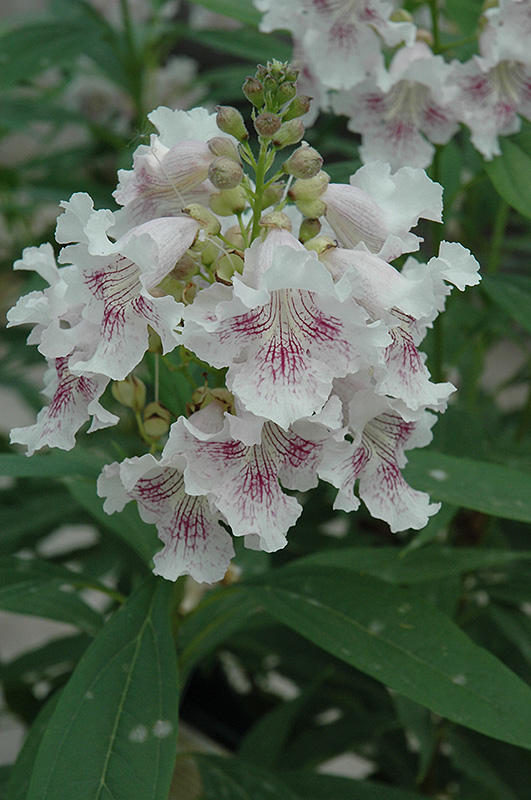>> Home
Height: 25 feet
Spread: 20 feet
Sunlight:
![]()
![]()
Hardiness Zone: 5
Description:
An interesting hybrid flowering tree or large shrub, a cross between the desert willow and catalpa; produces highly fragrant pink orchid-like flowers over an incredibly long season for a tree, extremely tolerant of dry, exposed sites
Ornamental Features
Pink Dawn Chitalpa features showy panicles of fragrant pink orchid-like flowers with lemon yellow throats and purple stripes rising above the foliage from late spring to early fall. It has dark green deciduous foliage. The large narrow leaves do not develop any appreciable fall color.
Landscape Attributes
Pink Dawn Chitalpa is a multi-stemmed deciduous tree with an upright spreading habit of growth. Its relatively coarse texture can be used to stand it apart from other landscape plants with finer foliage.
This tree will require occasional maintenance and upkeep, and is best pruned in late winter once the threat of extreme cold has passed. It is a good choice for attracting hummingbirds to your yard, but is not particularly attractive to deer who tend to leave it alone in favor of tastier treats. Gardeners should be aware of the following characteristic(s) that may warrant special consideration;
- Disease
Pink Dawn Chitalpa is recommended for the following landscape applications;
- Accent
Planting & Growing
Pink Dawn Chitalpa will grow to be about 25 feet tall at maturity, with a spread of 20 feet. It has a low canopy with a typical clearance of 2 feet from the ground, and should not be planted underneath power lines. It grows at a fast rate, and under ideal conditions can be expected to live for 50 years or more.
This tree does best in full sun to partial shade. It is an amazingly adaptable plant, tolerating both dry conditions and even some standing water. It is considered to be drought-tolerant, and thus makes an ideal choice for xeriscaping or the moisture-conserving landscape. It is not particular as to soil type or pH, and is able to handle environmental salt. It is highly tolerant of urban pollution and will even thrive in inner city environments. This particular variety is an interspecific hybrid.
